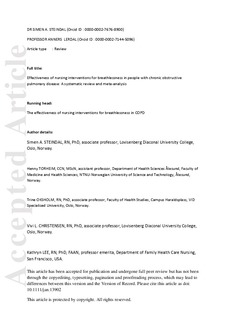| dc.contributor.author | Steindal, Simen Alexander | |
| dc.contributor.author | Torheim, Henny | |
| dc.contributor.author | Oksholm, Trine | |
| dc.contributor.author | Christensen, Vivi Lycke | |
| dc.contributor.author | Lee, Kathryn A | |
| dc.contributor.author | Lerdal, Anners | |
| dc.contributor.author | Markussen, Heidi Øksnes | |
| dc.contributor.author | Gran, Gerd | |
| dc.contributor.author | Leine, Marit | |
| dc.contributor.author | Borge, Christine Råheim | |
| dc.date.accessioned | 2019-06-11T08:09:59Z | |
| dc.date.available | 2019-06-11T08:09:59Z | |
| dc.date.created | 2018-09-28T08:08:00Z | |
| dc.date.issued | 2018 | |
| dc.identifier.issn | 0309-2402 | |
| dc.identifier.uri | http://hdl.handle.net/11250/2600410 | |
| dc.description.abstract | Aim
To critically review and synthesize the findings of studies that evaluated the effectiveness of nursing interventions for improving breathlessness in adults with chronic obstructive pulmonary disease.
Background
Systematic reviews of nursing interventions for breathlessness in people with chronic obstructive pulmonary disease have not been specifically addressed.
Design
Systematic review with meta‐analysis.
Data sources
A systematic search of Medline, CINAHL, PsycINFO and Embase was performed for studies published between January 2000 and June 2017.
Review methods
Risk of bias, data extraction and meta‐analysis were conducted using Cochrane methodology. The quality of evidence was assessed using the GRADE approach.
Results
Twenty papers were included. A meta‐analysis of interventions performed at home, including two trials, showed a significant effect in favour of experimental groups for the symptom score of the St. George Respiratory Questionnaire compared with controls. A meta‐analysis of interventions performed in clinics with home follow‐up showed a significant effect in favour of experimental groups for the mastery and fatigue scores of the Chronic Respiratory Questionnaire compared with controls. In this category of intervention, an additional meta‐analysis showed a significant effect in favour of experimental groups for the symptom, activity and total scores of the St. George Respiratory Questionnaire compared with controls. The quality of evidence was assessed to be very low to moderate.
Conclusion
The results are equivocal as to whether nursing interventions performed at home and nursing interventions performed in hospital with follow‐up improve breathlessness in people with chronic obstructive pulmonary disease. | nb_NO |
| dc.language.iso | eng | nb_NO |
| dc.publisher | Wiley | nb_NO |
| dc.title | The effectiveness of nursing interventions for breathlessness in people with chronic obstructive pulmonary disease: A systematic review and meta-analysis | nb_NO |
| dc.type | Journal article | nb_NO |
| dc.type | Peer reviewed | nb_NO |
| dc.description.version | acceptedVersion | nb_NO |
| dc.source.journal | Journal of Advanced Nursing | nb_NO |
| dc.identifier.doi | 10.1111/jan.13902 | |
| dc.identifier.cristin | 1615403 | |
| dc.description.localcode | Locked until 5.11.2019 due to copyright restrictions. This is the peer reviewed version of an article, which has been published in final form at [https://doi.org/10.1111/jan.13902]. This article may be used for non-commercial purposes in accordance with Wiley Terms and Conditions for Self-Archiving. | nb_NO |
| cristin.unitcode | 194,65,80,0 | |
| cristin.unitname | Institutt for helsevitenskap Ålesund | |
| cristin.ispublished | true | |
| cristin.fulltext | original | |
| cristin.qualitycode | 2 | |
